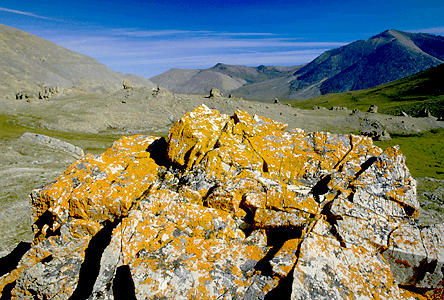Scientists Warn of Methane Time Bomb
Wednesday, July 24th, 2013July 24, 2013
The release of large amounts of methane gas from thawing permafrost in the Arctic could have an enormous impact on the world economy, announce scientists in the journal Nature. The researchers estimated that the effects of the release of methane on climates worldwide–through rising sea levels, flooding, and damage to agriculture and human health–could amount to as much $60 trillion, roughly the size of the global economy in 2012.
Scientists have for years warned of the dangers posed by rising temperatures on permafrost. Large amounts of methane gas are concentrated in the frozen Arctic tundra. Methane commonly forms when plants decay in places where there is very little oxygen in the ground, such as tundra. When the ground thaws, the methane is released into the atmosphere.

Methane is released from Arctic tundra as the permafrost melts due to global warming. (© Scott T. Smith, Corbis)
Semi-solid gas hydrates are also concentrated under the world’s oceans. Diminishing ice cover in the Arctic Ocean, especially the East Siberian Sea, is resulting in warmer waters, allowing methane to leach out. Plumes of the gas more than a half mile in diameter have been detected rising from the sea.
The authors of the study estimated that the release of methane from the Arctic at the current rate will likely increase global temperatures by 3.6 Fahrenheit (2 Celsius) degrees in 15 to 35 years. Peter Wadhams of the University of Cambridge warned of the possibly catastrophic effect on global climate: “We are seeing increasing methane in the atmosphere . . . and the place where the increase is happening most is over the Arctic.” One of the authors of the study, Gail Whiteman of Erasmus University in the Netherlands, stated “That’s an economic time bomb that at this stage has not been recognized on the world stage. . . . We think it’s incredibly important for world leaders to really discuss what are the implications of this methane release and what could we indeed do about it to hopefully prevent the whole burst from happening.”
Additional World Book articles:
- Geology 2012 (a Back in Time article)
- Another Greenhouse Troublemaker (a special report)


